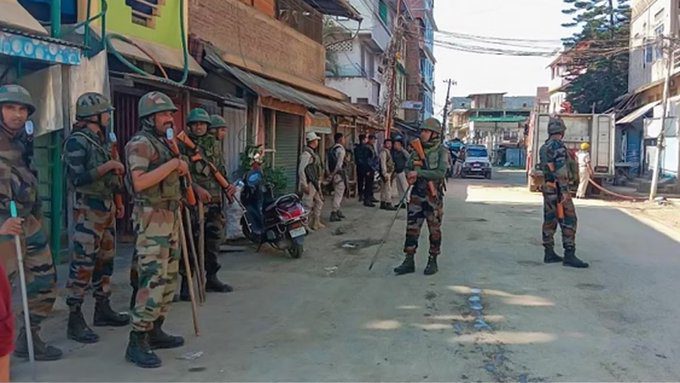The Indian Ministry of External Affairs has issued a stern warning against the EU after the European Parliament passed a resolution condemning the Indian government for fanning the flames of ongoing ethnic violence in the eastern state of Manipur.
Since May, Manipur has been plunged into a state of low-level civil war driven by sectarian rivalry between the majority Hindu Meitei population and the predominantly Christian Kuki tribe. So far at least 130 people have died.
Watch: What was said in EU Parliament on the human rights violations & ethnic & religious violence in Manipur, & the role of the Modi govt pic.twitter.com/hraVduEbpL
— Prashant Bhushan (@pbhushan1) July 14, 2023
The carnage stems from attempts by the regional BJP government to clamp down on Kuki poppy, which Kuki officials argue is part of a wider attempt to undermine their influence in the state.
The central Indian government has been accused of implicitly supporting Meitei militias. In response, New Delhi deployed 40,000 soldiers to quell the violence, which has often manifested itself through the systematic rape of women.
The European Parliament reacted by passing an emergency resolution on July 12th, pinning the violence on “nationalistic rhetoric” from India’s ruling Bharatiya Janata Party (BJP) government, accusing the government of promoting a form of “Hindu majoritarianism” against racial and religious minorities.
MEPs also called for aid agencies and independent observers to be given free access to the region.
Immediately after the resolution passed, Indian BJP officials took to social media to condemn the decision and linked it to a wider plot by the country’s opposition—and Western NGOs—to destabilise the ruling government by politicising the situation in Manipur.
It can’t be a mere coincidence that EU Parliament proposed to debate the conflict in Manipur, which it has no business venturing into, soon after Rahul Gandhi visits the state. Lets look at the sequence of events.
— Amit Malviya (@amitmalviya) July 15, 2023
Rahul Gandhi goes to London and seeks foreign intervention in… https://t.co/IeuViSGmRx pic.twitter.com/CCwdL7JvWz
The Indian Ministry of External Affairs also issued a statement, July 13th, saying that the resolution represented a “colonial mindset” active within the European Parliament, and that the EU would do better to look after its own internal affairs.
We have seen that the European Parliament held a discussion on developments in Manipur and adopted a so-called Urgency Resolution.
Such interference in India’s internal affairs is unacceptable, and reflects a colonial mindset.
Indian authorities at all levels, including the judiciary, are seized of the situation in Manipur and are taking steps to maintain peace and harmony and law and order.
The European Parliament would be well advised to utilize its time more productively on its internal issues.
Since taking power in 2014, Narendra Modi and his Hindu nationalist BJP party have been criticised repeatedly by Western human rights agencies for allegedly embracing a discriminatory form of right-wing Hindutva nationalism to the detriment of Muslim and Christian groups.
Despite this criticism, Modi was in Paris last week to sign a military partnership to supply India with French-made fighter jets and submarines, as the West seeks to shore up its alliance with India and prevent any potential geopolitical drift towards Russia.
Relations between Brussels and India have frayed in recent months over EU plans to introduce carbon tariffs on imported Indian products such as steel and cement.
The European Parliament’s resolution against the Indian government comes as MEPs implore the EU to implement guidelines protecting religious freedoms, particularly for persecuted Christian worldwide.






